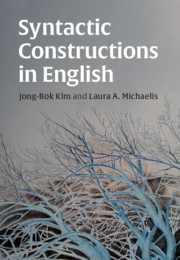8 - Auxiliary and Related Constructions
Summary
This chapter aims to address four key issues in the study of the English auxiliary system. The issues involve the properties that distinguish auxiliary verbs from main verbs, ordering restrictions among auxiliary verbs, combinatorial restrictions on the syntactic complements of auxiliary verbs, and auxiliary-sensitive phenomena like negation. The chapter first focuses on the morphosyntactic properties of English auxiliary verbs. We show that their distributional, ordering, and combinatorial properties all follow from their lexical groupings: modals, have/be, do, and to. The second part of this chapter concerns the so-called NICE phenomena, each of which is sensitive to the presence of an auxiliary verb and has been extensively analyzed in generative grammar. The chapter shows us that a construction-based analysis can offer a straightforward analysis of these phenomena, without reliance on movement operations or functional projections.
- Type
- Chapter
- Information
- Syntactic Constructions in English , pp. 186 - 215Publisher: Cambridge University PressPrint publication year: 2020

